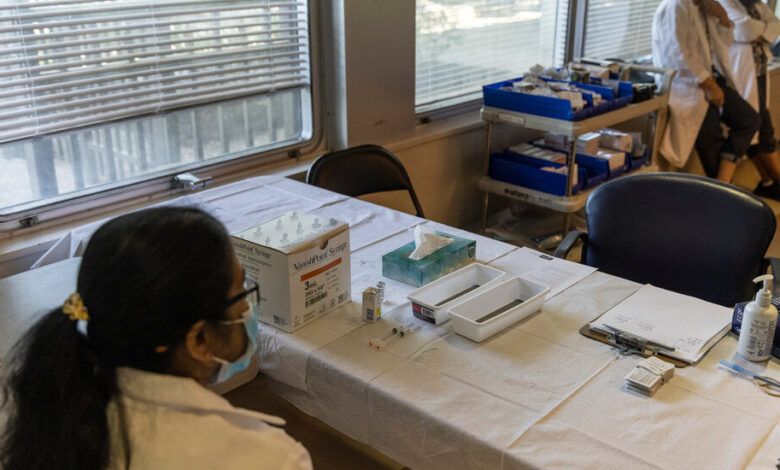New York May Face ‘Tip of the Iceberg’ With Polio, Health Chief Says

New York State health officials on Thursday intensified their push for people who have not been immunized against polio to get vaccinated “right away,” saying the one confirmed case of the disease found in the state may be “the tip of the iceberg” of a much wider threat.
The urgent call came as officials said polio had been detected in wastewater samples taken in several locations and at different times in two counties north of New York City, potentially signaling community spread of the disease.
“Based on earlier polio outbreaks, New Yorkers should know that for every one case of paralytic polio observed, there may be hundreds of other people infected,”Dr. Mary T. Bassett, the state’s health commissioner, said in a statement.
“Coupled with the latest wastewater findings,” Dr. Bassett added, “the department is treating the single case of polio as just the tip of the iceberg of much greater potential spread.”
Polio is caused by the poliovirus and children under 5 are most at risk of contracting it, but anyone who is unvaccinated is at risk. Polio is highly contagious, typically spreading from person to person when someone comes into contact with the feces of an infected person and then touches their mouth.
The Fight Against Polio
The highly contagious virus was one of the most feared diseases until the 1950s, when the first vaccine was developed.
- New York Case: Officials in a New York suburb reported a case of polio in an unvaccinated adult man in July — the first U.S. case in nearly a decade.
- A Multibillion-Dollar Effort: A partnership of national governments and health organizations has a plan to rid the world of polio by 2026, which is now endemic in just two countries.
- Major Obstacles: Two of the three strains of polio have been eliminated from the Earth. But new barriers to full eradication keep cropping up.
- Childhood Vaccinations Drop: A sharp decline in childhood vaccinations around the world during the coronavirus pandemic — including those for polio — could threaten the lives of millions of children.
Many cases are asymptomatic, and some can cause flulike symptoms, but the disease, also known as poliomyelitis, can be disabling and even life-threatening. There is no cure.
Paralysis is a rare outcome, but before vaccines were widely available in the 1950s, polio outbreaks caused more than 15,000 cases of paralysis a year.
Last month, a case of polio — the first to be reported in the United States in nearly a decade — was identified in an unvaccinated adult man in Rockland County. No cases had originated in the United States since 1979.
State and county health officials said the infection in Rockland County had been transmitted from someone who received the oral polio vaccine, which has not been administered in the United States since 2000.
The virus circulating in New York may have originated outside the United States, where the oral vaccine is still administered, officials said. The oral vaccine contains weakened virus. It is safe, but if vaccine-derived virus circulates in a community, it can infect unvaccinated people and spread the disease.
In announcing the case, officials emphasized that the infected person was no longer contagious and said that their efforts would focus on increasing rates of vaccination and on determining whether anyone else might have been affected.
Officials have said that polio had been found in Rockland County wastewater samples taken in June, before the polio case was confirmed. On Thursday, they said evidence of the illness had also been found in wastewater samples taken in June and July from two “geographically different” parts of Orange County, which is adjacent to Rockland.
“The findings,” the state Health Department said in a news release, “provide further evidence of local — not international — transmission of a polio virus.”
There was no indication that the infected man in Rockland County was the source of the polio found in the wastewater samples, officials said. The investigation into the virus’s origin is continuing.
Because widespread vaccination has proved to be an effective prevention strategy, areas with low immunization rates can be at particular risk of an outbreak.
In both Rockland and Orange Counties, about 60 percent of 2-year-olds have received all three doses of the polio vaccine, according to state data — a considerably lower rate than the 80 percent in the rest of the state excluding New York City. (To achieve herd immunity for polio, the target vaccination rate is 80 percent, according to the World Health Organization.)
Most adults in the United States need not get vaccinated against polio because they most likely were immunized as children, although some may be eligible for booster shots if they have an increased risk of exposure.